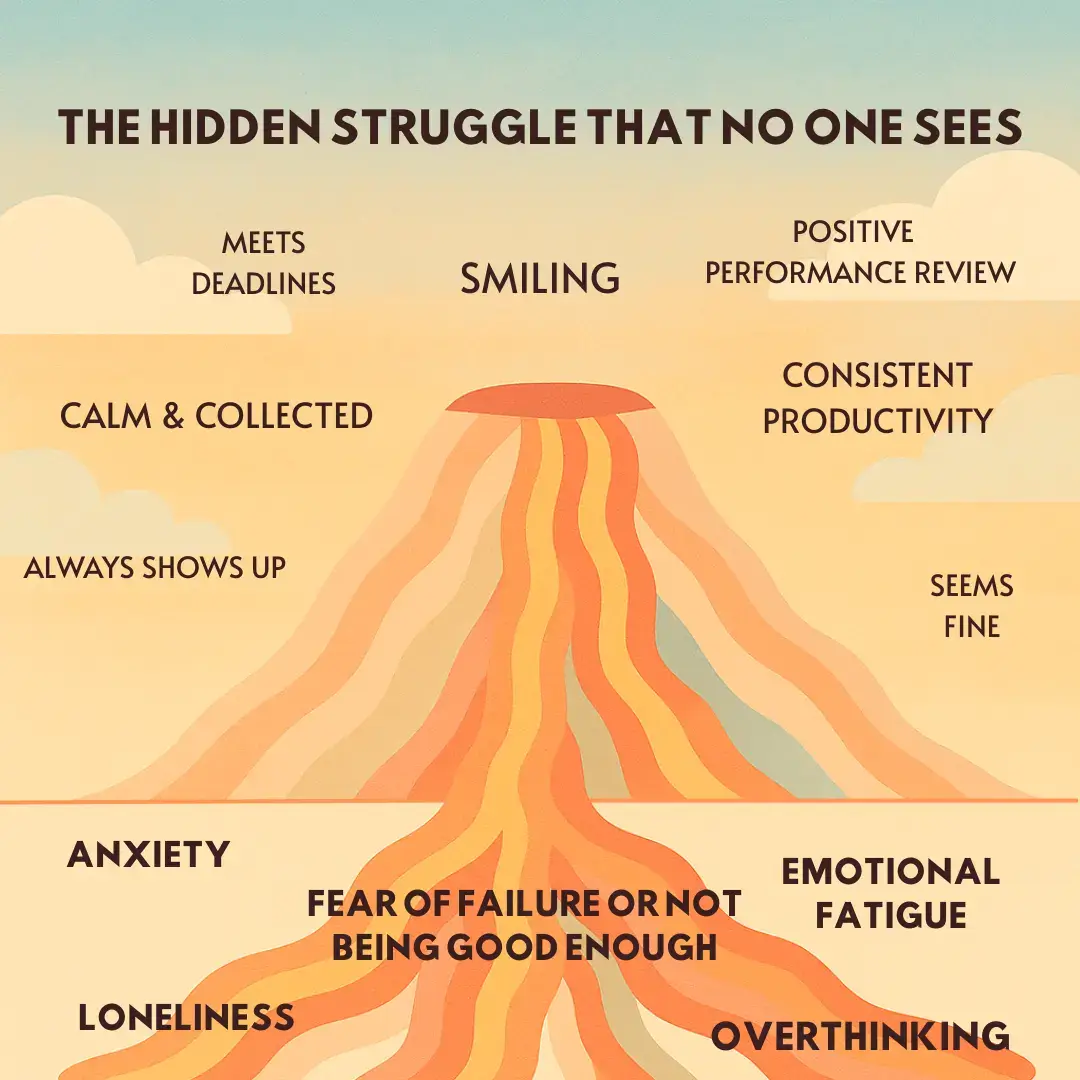On paper, everything looks fine.
You’re punctual. Productive. You show up to work, meet deadlines, and even crack a few jokes during team meetings. Friends see you as dependable. Your social media has memories of weekend brunches, travel snaps, and gym selfies.
But underneath it all, something feels… off. You’re exhausted in ways sleep can’t fix. Small tasks feel heavy. There’s a quiet ache, not loud enough to be called a crisis, but persistent enough to dull the joy out of life.
This is what it means to be high-functioning and still struggling.

You wear the mask, the illusion of “I’m fine”.
And it doesn’t help that functionality is mistaken for well-being in a society that values resilience, achievement, and composure, especially in fast-paced environments like Singapore. We’ve normalised pushing through stress, emotional numbness, and internal chaos as long as we’re “getting things done.”
Mental health isn’t always loud. Sometimes, it’s the silent storm inside a high performer. The one who organises team outings, aces presentations, and still lies awake at night questioning their worth. It’s the colleague who laughs in meetings but battles panic attacks alone in the bathroom. It’s the student who gets straight As but feels like they’re one misstep away from falling apart.
Looking okay isn’t the same as being okay. And high-functioning doesn’t mean not hurting.
Now, one may ask what high-functioning struggle looks like.
People who are high-functioning but struggling might not fit the stereotype of mental illness. That’s what makes it tricky.
Here are some subtle signs:
- Persistent fatigue, even with rest
- Overachievement as a coping mechanism
- Irritability masked as “just tired”
- Perfectionism that feeds self-doubt
- Difficulty slowing down or relaxing
- Emotional disconnection or numbness
- A constant inner critic despite external praise
Many clients we work with in Singapore feel like they’re “holding it together with tape.” Their struggles are hidden behind polished appearances, and their pleas for help are often whispered, if voiced at all. In such moments, turning to counselling in Singapore can offer a safe space to unpack what’s been carried alone for too long.
There is also this cultural weight of “Holding it together”
Singapore’s culture often emphasises productivity, responsibility, and self-reliance. These values make it hard to admit when you’re struggling. Seeking help might feel like weakness. Slowing down might feel indulgent. Talking about emotions might seem inappropriate.
But mental health isn’t a personal failure. It’s human. Behind the curated lives and KPI-driven days are people who need rest, connection, and room to not always be okay.
We strongly believe that you can’t heal what you hide.
When we only treat what’s visible, i.e., the burnout, the panic attacks, the sleep problems, we miss the deeper pain beneath. We also teach ourselves that struggle is only valid when it is shown. But healing begins when we permit ourselves not to be perfect.
Think of yourself as a duck gliding on water. Above the surface, you seem calm and composed. Below, you’re paddling furiously just to stay afloat. Now, imagine if the duck allowed itself to pause. What if it didn’t have to perform calmness, but could rest, breathe, and be supported?
High-functioning people often forget this: You are allowed to slow down. You are allowed to ask for help.
Here’s What You Can Do If This Is You:
🌱 Check in with yourself regularly. How are you…really? Practise honest self-reflection beyond the automatic “I’m fine.”
🌱 Stop romanticising over-functioning. Working late every night, skipping breaks, and saying yes to everything aren’t badges of honour if they’re rooted in fear or burnout.
🌱 Let someone in. You don’t have to go from silence to shouting. A quiet “I’ve been feeling off lately” to someone you trust is a powerful start.
🌱 Consider therapy even if you are “managing.” Mental health support isn’t only for crises. It’s also for maintenance, growth, and better understanding yourself. In fact, there are many in the workforce who also find access to therapy discreetly through an employee assistance program in Singapore, where it’s both convenient and affordable for them.
🌱 Reclaim rest. Rest isn’t laziness. It’s part of how we restore our minds and regulate our emotions. Ask yourself, “When was the last time I truly felt rested?” or “What makes me feel truly rested?”.
You Deserve More Than Survival
And if this blog speaks to you, know this: You’re not alone. Many people function at a high level while quietly carrying emotional pain. You don’t need to crash to be taken seriously. You don’t need to fall apart to justify care.
You deserve support, even if you’re “doing okay.”
Let’s normalise checking in on the people who seem the strongest. Let’s remind ourselves that struggle doesn’t always look like falling apart; sometimes, it seems like staying strong for too long.
And most of all, let’s remind each other: Being human is more important than being perfect.

